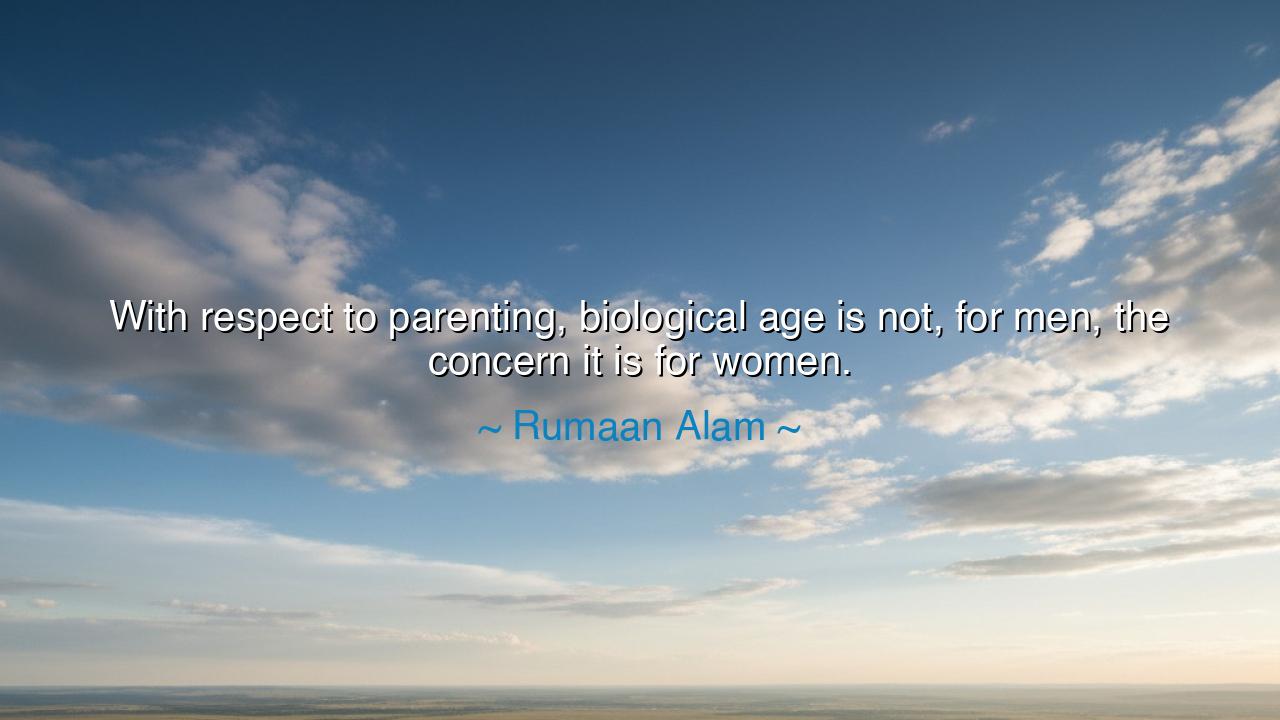
With respect to parenting, biological age is not, for men, the
With respect to parenting, biological age is not, for men, the concern it is for women.






Rumaan Alam, with the sharpness of truth and the weight of observation, once said: “With respect to parenting, biological age is not, for men, the concern it is for women.” These words are not only a reflection upon the differences of biology but also a meditation on the burdens, privileges, and imbalances carried between the two halves of humanity. He names what history has long revealed—that men may become fathers at almost any season of life, but for women, the sands of time weigh heavily, shaping when and how they may bear children.
The origin of this thought lies in the undeniable truth of nature. A woman’s body carries the miracle and the limitation of childbearing: her fertility has a season, and her strength is bound to rhythms and years. A man, however, may father a child long after his youth has passed, his biological clock less pressing, his possibilities stretching further into age. Alam does not say this to praise or condemn, but to draw attention to the unequal burdens placed upon mothers and fathers alike, and to remind us that society often forgets these realities when speaking of parenting.
History offers countless examples. Consider the great philosopher Socrates, who fathered children even in the later years of his life, his wisdom seasoned but his fatherhood still active. Or think of men such as Pablo Picasso, who became a father at an advanced age, leaving behind both art and offspring. By contrast, women of history—queens, poets, and saints—faced the pressing urgency of childbearing within the narrow span of their youth, often at great cost to their health and freedom. The difference is stark, and it shapes not only families but civilizations themselves.
Alam’s words also draw us to see the invisible weight borne by women. For men, biological age in parenting is rarely questioned. A father in his fifties or sixties is often praised as strong, even enviable. Yet for women, age becomes a mark of judgment: too young and she is deemed reckless, too old and she is deemed selfish. This double standard has endured across cultures, reminding us that biology, though impartial, is interpreted through the lens of society’s expectations.
Yet within this imbalance lies a deeper truth: that fatherhood, though biologically less constrained, carries its own moral responsibility. If a man can father children across the span of his years, then he must also ask whether he has the strength, patience, and wisdom to raise them. To create life is not enough; to nurture it, guide it, and sacrifice for it is the true test of a father. Biological freedom is no license for carelessness—it is a greater call to responsibility.
The lesson here is profound: recognize the sacred weight of time in parenting. For women, honor their struggles, their urgency, their sacrifices, and support them with compassion rather than judgment. For men, acknowledge the gift of their extended years, but do not misuse it; let them embrace fatherhood with seriousness, remembering that the call to nurture is no less pressing because it comes later in life. For both, the duty is the same: to raise children with love, wisdom, and endurance.
Therefore, let Rumaan Alam’s words be remembered: “Biological age is not, for men, the concern it is for women.” They remind us of life’s imbalance, but also of the sacred duty that transcends biology. Whether young or old, mother or father, each who brings forth life must honor it with devotion. Let us not be blinded by privilege or crushed by limitation, but let us walk with humility, knowing that the true measure of a parent is not in years but in love steadfastly given.






AAdministratorAdministrator
Welcome, honored guests. Please leave a comment, we will respond soon